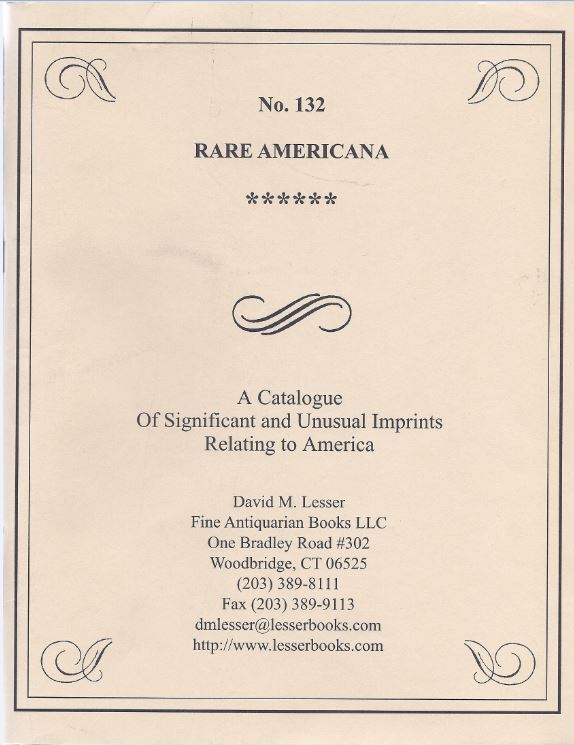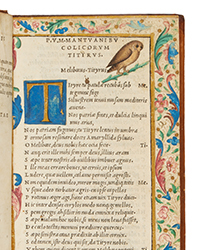David M. Lesser Fine Antiquarian Books recently published No.132 of Rare Americana. Lesser mostly focuses on pamphlets and other shorter form material pertaining to 18th and 19tth century America. This time, however, we find many longer, book-length items offered. The subjects are similar – American history mostly from revolutionary times to Reconstruction (with a few items on each side of that range), but many are thicker than usual. Here are some examples from this latest selection.
We will start with a sermon that must have taken a fair amount of courage to deliver. Rev. Charles Turner was not wanting for the same. Item 148 is A Sermon Preached Before His Excellency Thomas Hutchinson, Esq., Governor...of the Province of the Massachusetts-Bay in New England, May 26th, 1773. Hutchinson was Massachusetts' loyalist Governor, a man who came to be despised by his subjects. He supported the Crown at every turn against the colonists, including the myriad of taxes and regulations imposed upon them from afar. He would be driven by the colonists back to Britain a year after this sermon. In his speech, Rev. Turner did not hold back, though he surely knew this would not please his notable guest. He asserts that the people have an “unalienable right” to determine their own form of government, and that the privileges of the British constitution they formerly enjoyed have been “inhumanly murdered.” Turner adds, “How distressing the thought of being slaves, how charming that of being free!” Though beloved by his Duxbury congregation, Turner resigned his post a year later citing health issues and completion of his mission, but would go on to serve in the conventions that accepted the state and federal constitutions, and later headed off to retirement in Maine. Priced at $500.
There were few more notable feuds among America's founders than that between fellow Federalists John Adams and Alexander Hamilton. Not even Adams' legendary rivalry with Jefferson, or Hamilton's with Aaron Burr that eventually cost him his life in a duel, could quite match this one. There was certainly a split in their opinions on how to react to French intrigues during Adams' presidency, Hamilton itching for war, Adams seeking to avoid it. However, this rivalry was based more on personalities than policies. Adams was an obstinate, unbending man who took orders from no one. Hamilton was self-assured and believed Adams should bend to his influence. The result was this rivalry between the Federalist party's two major forces would soon lead to the party's demise. In 1800, when President Adams sought reelection, Hamilton wrote a lengthy letter tearing him to pieces, though ending with a reluctant, pro forma endorsement. Meanwhile, he connived behind the scenes to get the Federalist vice-presidential nominee, Charles Pinckney, selected over Adams. In his letter, Hamilton writes such words about Adams as “there are great and intrinsic defects in his character, which unfit him for the office of Chief Magistrate,” and that Adams has “a vanity without bounds, and a jealousy capable of discoloring every object.” Undoubtedly there was much truth to this, though the same could be said about Hamilton. When Jefferson's supporters got a hold of this letter, meant only for fellow Federalists, they published it. It was instrumental in defeating Adams in the 1800 election, and effectively destroying the Federalist Party. Item 55 is the Letter from Alexander Hamilton, Concerning the Public Conduct and Character of John Adams,published in 1800. $850.
The airing of the Hamilton-Adams dirty laundry in public was momentous, this next one pedestrian. This is really not the type of stuff one should be publishing for the world to see, but evidently some public accusations had been made against Rev. Henry Whipple, Pastor of the Episcopal Church in Galena, Illinois. He had no choice but to respond. Whipple married Emma Weigley in 1862. She felt he treated her badly and ran back to her father's home the following year. The caption title to this brief work sums up the Reverend's response: To the members of the R.R. [Rock River] Conference...Dear Brethren: Most gladly would I have averted so terrible a calamity as that which has befallen my family, but it was not in my power. And, in view of the final judgment, I can truly say, no man ever more sincerely and affectionately offered terms of peace and reconciliation than I have to my mistaken and erring wife... We do not know whether his “erring” wife ever saw the error of her ways. Item 155. $350.









